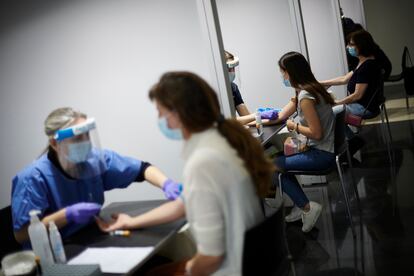Spain will do PCR tests on all close contacts of Covid-19 cases
A stricter protocol seeks to contain new outbreaks as the country emerges from a prolonged lockdown

Spain’s Health Ministry and the regional governments have agreed to a stricter protocol for coronavirus testing. From now on, all close contacts of a positive case will undergo PCR testing, regardless of whether they show symptoms or not, healthcare sources told EL PAÍS.
These sources said that the new document is being finalized and has been sent to the relevant health authorities: “It’s just a matter of days before it goes into effect.”
Scientific groups have expressed satisfaction at the change. In recent days, several experts had voiced concerns about what they’d described as “an open crack” in the Covid-19 containment effort.
Those second positives could slip through the cracks if they were asymptomatic throughout the quarantine periodSantiago Moreno, Ramón y Cajal Hospital
It is not just Spain that is concerned about new outbreaks as it gradually emerges from a prolonged lockdown that began in mid-March. A recent report by the European Center for Disease Control and Prevention (ECDC) takes it for granted that there will be a resurgence of Covid-19 on the continent in the coming weeks, as countries lift the restrictions of the past few months.
The efficiency of the monitoring measures will determine whether this spike in cases takes the form of small, contained outbreaks or a second big wave.
The current protocol in Spain establishes that close contacts of a positive case must self-quarantine for 14 days, but only those showing symptoms are being checked for coronavirus with PCR lab tests. A close contact is considered to be anyone who has cared for a positive case or been with him or her for more than 15 minutes at a distance of less than two meters.
“This left a crack open for transmission chains to go through,” said José Miguel Cisneros, head of infectious diseases at Virgen del Rocío Hospital in Seville. “The most likely situation is that there will be another positive case near the first one. And the only way to find it, and end the outbreak, is to do PCR tests on all close contacts.”
“Those second positives could slip through the cracks if they were asymptomatic throughout the quarantine period,” said Santiago Moreno, head of infectious diseases at Ramón y Cajal Hospital in Madrid.
Jordi Vila, president of the Spanish Society of Infectious Diseases and Clinical Microbiology (SEIMC) said that “the current circumstances favor change. Right now we have resources that we didn’t have three months ago. And the incidence of the disease is low. So we need to be very rigorous and thorough about investigating and ending any outbreak.”
Room for improvement
But experts still see room for improvement, and cite outbreaks like the recent one in the area of La Garrotxa, in the Catalan province of Girona, with 31 positive cases. The first case was detected on May 27, yet the outbreak was not declared until 10 days later. The regional government did not explain the reasons for this delay.
“It’s too long,” said Pere Godoy, head of the Spanish Epidemiology Society (SEE). “It is essential for the shortest amount of time possible to elapse between the first signs, the PCR test and the contact tracing.”
Cisneros said that the important thing is for citizens to see a doctor if they are experiencing any cold or other symptoms compatible with the coronavirus. “I know it’s a change from what we’ve been telling citizens in recent years, to only go to the doctor for important things. But this is the important thing now, because the people passing on the virus the most are those who keep leading normal lives because they only have mild symptoms.”
Contact tracing
Fernando García Benavides, a professor of public health at Pompeu Fabra University in Catalonia, stressed the importance of contact tracing, and noted that some regions of Spain have yet to develop efficient teams: “Now we have the technological capacity, but we’re short on professional capacity.”
The ECDC’s latest risk assessment said there is a “moderate” to “high” risk of a rise in coronavirus incidence in the coming weeks that would force authorities to reintroduce physical distancing measures.
Most of Spain is in a moderate risk situation, according to the ECDC, although there is still community transmission in places like Madrid and Barcelona, and not all monitoring and control systems have been shown to work at full capacity.
English version by Susana Urra.
Tu suscripción se está usando en otro dispositivo
¿Quieres añadir otro usuario a tu suscripción?
Si continúas leyendo en este dispositivo, no se podrá leer en el otro.
FlechaTu suscripción se está usando en otro dispositivo y solo puedes acceder a EL PAÍS desde un dispositivo a la vez.
Si quieres compartir tu cuenta, cambia tu suscripción a la modalidad Premium, así podrás añadir otro usuario. Cada uno accederá con su propia cuenta de email, lo que os permitirá personalizar vuestra experiencia en EL PAÍS.
¿Tienes una suscripción de empresa? Accede aquí para contratar más cuentas.
En el caso de no saber quién está usando tu cuenta, te recomendamos cambiar tu contraseña aquí.
Si decides continuar compartiendo tu cuenta, este mensaje se mostrará en tu dispositivo y en el de la otra persona que está usando tu cuenta de forma indefinida, afectando a tu experiencia de lectura. Puedes consultar aquí los términos y condiciones de la suscripción digital.









































